A Conversation With Alex Ross Perry (THE COLOR WHEEL)
Since the long planned HTN conversation between myself and Alex Ross Perry was also shaping up to be his last—at least with regards to his film The Color Wheel‘s impending theatrical release in New York City (on Friday, May 18, 2012 at BAM)—we decided to resurrect the ol’ HammeredToNail concept and drink some drunk sauce before sitting down to chat. We also figured that since Perry’s presentation of Vincent Gallo’s Buffalo ’66 at the 92YTribeca was only two days away, bowling was in order. And so we met up at Sunset Park’s Melody Lanes on a quiet Monday night, where Perry proved his fondness for Gallo’s 1998 feature-length debut by recreating a scene from the film…
Perry’s second feature, The Color Wheel, is a blast of hilarious cinematic discontent. To pull just one paragraph from Tom Hall’s excellent HTN review:
“Like all great fiction, The Color Wheel operates in the heightened atmosphere of Perry’s storytelling technique, his style and tone focusing the audience’s attention on the spitfire dialogue and comic situations so that the images are allowed to provide a discomforting, conscious dissonance that eases itself under the skin. In the wrong hands, this strategy could make for a coy game, the structure of the story utilized to set things up and inevitably knock them down, but Perry seems to have something much more important in mind; mapping the emotional journey toward reconciliation and desire, masked the entire time as an endless search for dignity in a world that doesn’t even acknowledge the stakes.” (Read the full review here)
As this is without a doubt one of the more epic conversations we’ve ever posted at HTN, we should probably just get to it. But I would like to close out this intro by clarifying that Perry is making a name for himself as someone who speaks his mind without any filter, yet here, he bravely and freely dives into topics that filmmakers often don’t discuss—i.e., that mysterious, but exhilarating, gap between how it feels to receive a string of rejections for your film, to being taken seriously as a filmmaker. Perhaps the three pitchers of beer had something to do with it, but something similar to this likely would have happened anyway!
Hammer to Nail: In the press, you’ve sort of become known as the “video store filmmaker guy.” Obviously, any press is good press, and the people who are writing about you are writing favorably—it’s not like anyone is writing articles about you saying why you shouldn’t be written about…
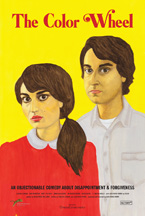 Alex Ross Perry: They would if they could. [H2N laughs] I mean, I own the video store past. I love it. I mention it triumphantly during interviews. Obviously, anyone I’m talking to who’s a New York-based critic, they were all around when Kim’s was on St. Mark’s. Which, I should point out, it is not anymore, but it is still open on 1st Avenue. They all came to that store. Some people were like, “I remember you.” Like I remember last year in Maryland we were talking about Glenn Kenny [ED. NOTE: Dear Glenn, we were discussing your impressively giddy penchant for starting Twitter wars, so please feel free to not start one with us!], but I first met him as some guy who came into Kim’s. And Gavin Smith as well. I encountered them as customers. I love it. It was a great time.
Alex Ross Perry: They would if they could. [H2N laughs] I mean, I own the video store past. I love it. I mention it triumphantly during interviews. Obviously, anyone I’m talking to who’s a New York-based critic, they were all around when Kim’s was on St. Mark’s. Which, I should point out, it is not anymore, but it is still open on 1st Avenue. They all came to that store. Some people were like, “I remember you.” Like I remember last year in Maryland we were talking about Glenn Kenny [ED. NOTE: Dear Glenn, we were discussing your impressively giddy penchant for starting Twitter wars, so please feel free to not start one with us!], but I first met him as some guy who came into Kim’s. And Gavin Smith as well. I encountered them as customers. I love it. It was a great time.
H2N: You’ve had good press already and the film hasn’t even officially opened. Has there been anything that you feel has been misrepresented or not represented about you? Have interviews been steering in a similarly broad or generic direction that is frustrating or annoying?
ARP: That’s a good question. I don’t know. Let me think about that for a minute.
H2N: Take your time. Breathe deeply.
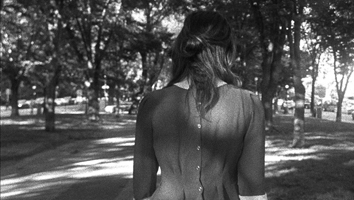 ARP: I don’t know if anything has been out there that I’m like, “I wish this was part of the story,” because up until the New York Times piece, I had wished that the rejection and frustration that I felt was part of the story. I have this thing that I haven’t finished yet, I guess I should finish it this week. I started working on it in December. But it’s just like a four-part journalistic piece about the four sections of my life last year. The first section being the movie being rejected constantly; the second section being Sarasota through BAM; the third section being post-BAM into Locarno/international premiere; and the fourth section being out of town every week for two-and-a-half months. Those were like the four parts of the year, and I tried to write something that compartmentalized each one of those four things. And I’m glad that the initial failure of the movie to connect with festival programmers is a part of it, because I own that. And I think, fundamentally and importantly, I would hope that other filmmakers who… I remember being at Kim’s and reading indieWIRE or, at that point it was like GreenCine Daily or wherever David Hudson was [H2N laughs]. I was reading the news. I was very aware of that, and I was very curious about what the other side of that situation was like. And something that’s interesting to me is other people who might be in that position right now, knowing what options there are. I hope that being the guy who was in a video store stocking DVDs of people who are now “peers” and reading this news on my computer at work about people who are now my friends, I hope that that’s part of the story. And I’m glad that it is to some extant, because I don’t want anyone ever to think that this was an easy, front-door situation up to this point. I value the experience of making one movie that I struggled to make, and struggled to put out into the world in a way that was frustrating and difficult, as the movie befitted [that type of] reaction. And then coming back stronger, very soon thereafter, with a movie that connected much more personally with people. I’m glad that the failure and struggle that I experienced is part of my story. ‘Cause I feel like there’s a lot of people that we see and know, about whom that failure and struggle is not part of their narrative. And I’m glad that the narrative for this movie includes working at a video store, making one movie that played places that I was happy with, but then making another movie that played even more places. I’m glad that’s the story, because that was the story for me. I had a really hard time.
ARP: I don’t know if anything has been out there that I’m like, “I wish this was part of the story,” because up until the New York Times piece, I had wished that the rejection and frustration that I felt was part of the story. I have this thing that I haven’t finished yet, I guess I should finish it this week. I started working on it in December. But it’s just like a four-part journalistic piece about the four sections of my life last year. The first section being the movie being rejected constantly; the second section being Sarasota through BAM; the third section being post-BAM into Locarno/international premiere; and the fourth section being out of town every week for two-and-a-half months. Those were like the four parts of the year, and I tried to write something that compartmentalized each one of those four things. And I’m glad that the initial failure of the movie to connect with festival programmers is a part of it, because I own that. And I think, fundamentally and importantly, I would hope that other filmmakers who… I remember being at Kim’s and reading indieWIRE or, at that point it was like GreenCine Daily or wherever David Hudson was [H2N laughs]. I was reading the news. I was very aware of that, and I was very curious about what the other side of that situation was like. And something that’s interesting to me is other people who might be in that position right now, knowing what options there are. I hope that being the guy who was in a video store stocking DVDs of people who are now “peers” and reading this news on my computer at work about people who are now my friends, I hope that that’s part of the story. And I’m glad that it is to some extant, because I don’t want anyone ever to think that this was an easy, front-door situation up to this point. I value the experience of making one movie that I struggled to make, and struggled to put out into the world in a way that was frustrating and difficult, as the movie befitted [that type of] reaction. And then coming back stronger, very soon thereafter, with a movie that connected much more personally with people. I’m glad that the failure and struggle that I experienced is part of my story. ‘Cause I feel like there’s a lot of people that we see and know, about whom that failure and struggle is not part of their narrative. And I’m glad that the narrative for this movie includes working at a video store, making one movie that played places that I was happy with, but then making another movie that played even more places. I’m glad that’s the story, because that was the story for me. I had a really hard time.
I’ve described this a lot, but I finished cutting my first movie in November-ish of 2008. And from then until April of 2009, when it started getting offers to screen, I think of that as the worst period of my adult life. I’ve never been more miserable or frustrated or depressed.
H2N: How old were you then? You’re still really young.
ARP: I was 24.
H2N: Geez.
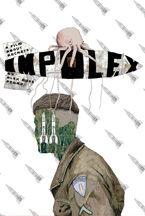 ARP: The last day of filming was my 24th birthday. So I’m 24, it’s November, December, January, February, March, April, the movie’s being turned down, and I had put so much into it. I still think that was really the worst period of my life, because there is nothing harder than being at square one with a film. I now have, as a lot of people do, a network of friends/filmmakers/programmers/critics who I can reach out to. But the point where you don’t have any of that is baffling. There’s nothing to do. And that’s where I was. I had no clue how I was going to get out of that ghetto. That was the worst. But I got it places. We screened at CineVegas and I had a great time and met a lot of people at other fun festivals. But then I really quickly wanted to do something else. I knew a few people, and there are certain things that wouldn’t have been possible without that first movie. People like Eric [Allen Hatch] at Maryland, who were like, “Oh, I like Impolex. Not gonna show it, but send me your future stuff.” And obviously we had a fantastic screening [of The Color Wheel] there. Or Jake [Perlin, Cinema Conservancy/The Film Desk], who was like, “I really like it, let me see what else you do.” So I have a very strong relationship with that time when there’s nothing, and there’s failure everywhere, and success is passing you by. And working at a video store and making cheap, scrappy movies that presumably have no audience—no audience—was very ugly and challenging. It was very hard to get through that. So it is very bizarre to be out of those woods now.
ARP: The last day of filming was my 24th birthday. So I’m 24, it’s November, December, January, February, March, April, the movie’s being turned down, and I had put so much into it. I still think that was really the worst period of my life, because there is nothing harder than being at square one with a film. I now have, as a lot of people do, a network of friends/filmmakers/programmers/critics who I can reach out to. But the point where you don’t have any of that is baffling. There’s nothing to do. And that’s where I was. I had no clue how I was going to get out of that ghetto. That was the worst. But I got it places. We screened at CineVegas and I had a great time and met a lot of people at other fun festivals. But then I really quickly wanted to do something else. I knew a few people, and there are certain things that wouldn’t have been possible without that first movie. People like Eric [Allen Hatch] at Maryland, who were like, “Oh, I like Impolex. Not gonna show it, but send me your future stuff.” And obviously we had a fantastic screening [of The Color Wheel] there. Or Jake [Perlin, Cinema Conservancy/The Film Desk], who was like, “I really like it, let me see what else you do.” So I have a very strong relationship with that time when there’s nothing, and there’s failure everywhere, and success is passing you by. And working at a video store and making cheap, scrappy movies that presumably have no audience—no audience—was very ugly and challenging. It was very hard to get through that. So it is very bizarre to be out of those woods now.
H2N: So you make two movies in which you tell yourself, “These are not for everybody”—I mean, I presume you said that to yourself, because if not you’re pretty much insane—but when the moment comes to present it to an audience of actual human beings, of course you start to think, “Man, I really hope everyone loves them.” I honestly feel like that’s all a pre-film introduction is. I mean, maybe you don’t feel this way, but the question of being liked still remains. How do you reconcile your desire to have your films universally loved while at the same time knowing that you are making work for a very specific breed of viewer?
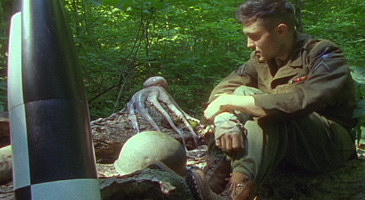 ARP: I was 24 when Impolex premiered. We had one screening at Anthology at Migrating Forms, before officially unveiling a 35mm print at CineVegas. All my friends came and saw it in New York—it was this thing you’d been working on for two years. And you know, whatever, it’s your friends, it went well. Then at CineVegas I met all these people. Sean [Price Williams] and Jessica [Oreck] were there, because Beetle Queen was playing. I had met a lot of people, but both of our screenings were at like 11:30 at night and were weird. I feel like at that point in the film’s life of having watched it during editing, I was very comfortable with the expectations of it as being something I really wanted to catch on, a fun midnight movie. I was really honored to be in their ‘weird movie’ sidebar.
ARP: I was 24 when Impolex premiered. We had one screening at Anthology at Migrating Forms, before officially unveiling a 35mm print at CineVegas. All my friends came and saw it in New York—it was this thing you’d been working on for two years. And you know, whatever, it’s your friends, it went well. Then at CineVegas I met all these people. Sean [Price Williams] and Jessica [Oreck] were there, because Beetle Queen was playing. I had met a lot of people, but both of our screenings were at like 11:30 at night and were weird. I feel like at that point in the film’s life of having watched it during editing, I was very comfortable with the expectations of it as being something I really wanted to catch on, a fun midnight movie. I was really honored to be in their ‘weird movie’ sidebar.
So then, two years later, I’m showing The Color Wheel in Sarasota. The first screening of it is at, I don’t know, 8 o’clock, during the beach party. [H2N laughs] It’s in a Regal multiplex. Nothing can prepare you for that experience. [H2N laughs heartily] You can go to a festival where you know 50 people, your premiere is the thing, everyone comes to that first screening, critics come to it… I’ve still never had that. The first screening [of The Color Wheel] was in a Regal.
H2N: You had BAMcinemaFEST, though.
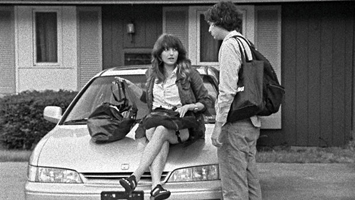 ARP: But that came later. That was after important things. Sarasota and Maryland were both very important, because those are both hugely filmmaker-centric places—and I say this as a compliment—with no industry presence. I’m not bemoaning that fact. I’m saying it’s amazing that both of these festivals exist without that crap. Sarasota was all about a handful of people seeing the movie—you, James Johnston, [Aaron] Hillis, Amy Seimetz—just a handful of people who were curious. That was important, I had a great time. I met Calvin [Lee Reeder], I met James, and I met Rick Alverson, and Mark [Jackson] and Joslyn [Jensen]. It was a lot of fun, and all of a sudden it was like, “Oh, we’ll see you in two weeks in Maryland.” And by the time we got to Maryland, you and other people had told people about it who missed it, and we had this one screening in Maryland that was sold out. And I feel like half the people were badge holders. Like Todd Rohal came, and Calvin and Lindsay came… I feel like everyone who was at the festival was at this one screening. And then everyone was just like, “This is fun, we’re gonna talk about this.” David Lowery saw it in Maryland. Between those two festivals, I thought, “This is great. Everyone who has a movie this year who’s interesting has seen the movie at this point in a theater. They’re all having a good time.” And this was a slow process, because I feel like at Sarasota and at Maryland I was the outsider, because half/two-thirds of the films had been at festivals earlier in the year and already had a reputation, and we were the one there with no reputation. And that was an outsider thing and was difficult, until you get there and you realize filmmakers don’t care about that. There’s no one in those tents [note: Maryland has a filmmaker tent where most folks congregate] who’s judgmental, who’s like, “I don’t want to see your movie because it’s only premiering here.” So that was amazing and helped a lot. Those were our first festivals: Sarasota and Maryland. And then at BAM, the buzz couldn’t have been better. People had been talking about it.
ARP: But that came later. That was after important things. Sarasota and Maryland were both very important, because those are both hugely filmmaker-centric places—and I say this as a compliment—with no industry presence. I’m not bemoaning that fact. I’m saying it’s amazing that both of these festivals exist without that crap. Sarasota was all about a handful of people seeing the movie—you, James Johnston, [Aaron] Hillis, Amy Seimetz—just a handful of people who were curious. That was important, I had a great time. I met Calvin [Lee Reeder], I met James, and I met Rick Alverson, and Mark [Jackson] and Joslyn [Jensen]. It was a lot of fun, and all of a sudden it was like, “Oh, we’ll see you in two weeks in Maryland.” And by the time we got to Maryland, you and other people had told people about it who missed it, and we had this one screening in Maryland that was sold out. And I feel like half the people were badge holders. Like Todd Rohal came, and Calvin and Lindsay came… I feel like everyone who was at the festival was at this one screening. And then everyone was just like, “This is fun, we’re gonna talk about this.” David Lowery saw it in Maryland. Between those two festivals, I thought, “This is great. Everyone who has a movie this year who’s interesting has seen the movie at this point in a theater. They’re all having a good time.” And this was a slow process, because I feel like at Sarasota and at Maryland I was the outsider, because half/two-thirds of the films had been at festivals earlier in the year and already had a reputation, and we were the one there with no reputation. And that was an outsider thing and was difficult, until you get there and you realize filmmakers don’t care about that. There’s no one in those tents [note: Maryland has a filmmaker tent where most folks congregate] who’s judgmental, who’s like, “I don’t want to see your movie because it’s only premiering here.” So that was amazing and helped a lot. Those were our first festivals: Sarasota and Maryland. And then at BAM, the buzz couldn’t have been better. People had been talking about it.
H2N: Did you guys have a BAMcinemaFEST press screening?
ARP: Yeah. It was after Weekend. The opening night movie and then us. They were both repped by Adam Kersh [of Brigade Marketing], and he convinced everyone who watched Weekend to stay for my movie. Because Weekend was at noon and we were at like two.
H2N: That’s an awesome double-bill!
ARP: Adam was there. He stood in the lobby and said, “Everyone stick around! This next one’s my movie too.” There were like 10 or 12 people there. Did you have a publicist at Sundance?
H2N: Yeah, Adam.
ARP: He is great. The best.
H2N: He’s a stone cold hustler.
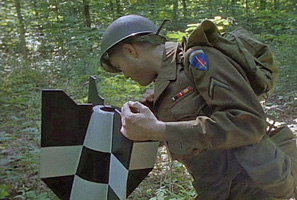 ARP: I’d never understood the value of a publicist, or publicity, at this point. We’re talking June of 2011. I had spent years working at a video store, making my first movie, and everywhere Impolex played, it was like, “Here is the lineup announcement, this movie, this movie, this movie, click ‘here’ for the rest.” And we were always ‘the rest.’ It was never in the headline of the announcement, or even in the body of the press release. And I was like, “How does this work? Why aren’t we in there?” Then we worked with Adam and I realized, “This is why.” Because there are people who are professionals who make that hustle happen.
ARP: I’d never understood the value of a publicist, or publicity, at this point. We’re talking June of 2011. I had spent years working at a video store, making my first movie, and everywhere Impolex played, it was like, “Here is the lineup announcement, this movie, this movie, this movie, click ‘here’ for the rest.” And we were always ‘the rest.’ It was never in the headline of the announcement, or even in the body of the press release. And I was like, “How does this work? Why aren’t we in there?” Then we worked with Adam and I realized, “This is why.” Because there are people who are professionals who make that hustle happen.
H2N: You weren’t in Maryland in time for the Filmmakers Take Charge conference on Friday last week, but that was a big topic of discussion, and I, and many other folks, came to the defense of publicists. Especially the good ones, which there are. Adam and Susan Norget spring to mind right away.
ARP: I didn’t know what the difference was. I could’ve been sending emails to people I knew socially, or who I didn’t know, and they’d be like, “Yeah, your movie’s playing at BAM. Big deal. It didn’t premiere anywhere I care about. It’s played at Sarasota and Maryland. I’m not interested.” But Adam just totally hustled it. He got us a Variety review out of BAM. After the Weekend press screening, he convinced A.O. Scott to stay and watch our movie in the theater, which doesn’t amount to anything specifically, but you need someone like him to do that, which I didn’t know. And the difference between a movie you hear about when you’re looking at the complete lineup or when there is a profile of the filmmaker, is someone like Adam. He got me an indieWIRE profile in, what’s that column, “Futures.” He hooked that up. I could never have done that. But he just does that, and that’s a very bizarrely important thing. So BAM was living in that shadow. He had gotten us a ton of great press. We had that profile. You and I did that Brooklyn interview for the Wall Street Journal. That was part of it. He cared about that.
At this point, we’re like two months to the day from the Sarasota screening. We’re premiering at home, where I live, and where everyone in the movie lives. And it was a huge thing, a big deal. It was one of the movies you heard about at the festival more than the other movies. And we didn’t come with the, like, Weekend SXSW buzz. Even though it was bought and paid for, people perceived it as genuine buzz.
H2N: But it was genuine too! That Sarasota buzz was because we were all sitting in a row watching your movie and laughing hysterically at it. You can’t buy that. So it’s a simultaneous blend of Adam being great at his job and hustling, and you having made a ferociously funny movie that people were genuinely digging.
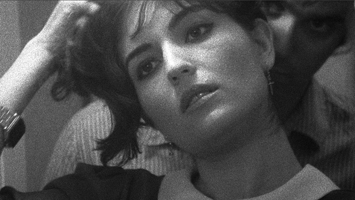 ARP: Obviously, you can take a mule to water but you can’t make it drink. The press is a mule [H2N laughs]. You can take it to a press screening but you can’t make it drink the Kool-Aid. I’m not saying that the difference between a movie that is good and bad is publicity. But the difference between a good movie that you hear a lot about and a movie you don’t hear anything about is publicity. We were very lucky that very shortly after our premiere we had an amazing New York premiere at the best festival in New York. If we’d played at New Directors or Tribeca, we would’ve been buried. No question. BAM was very nurturing. They loved the Brooklyn filmmaker aspect of it, which you were a part of, and Sophia [Takal, Green]. And other people who lived in Brooklyn, who I immodestly will claim that I go to see movies there more often than any of them. [H2N laughs] I mean, factually, I have my movie database to prove that. [H2N laughs louder] The day of our screening was Sunday.
ARP: Obviously, you can take a mule to water but you can’t make it drink. The press is a mule [H2N laughs]. You can take it to a press screening but you can’t make it drink the Kool-Aid. I’m not saying that the difference between a movie that is good and bad is publicity. But the difference between a good movie that you hear a lot about and a movie you don’t hear anything about is publicity. We were very lucky that very shortly after our premiere we had an amazing New York premiere at the best festival in New York. If we’d played at New Directors or Tribeca, we would’ve been buried. No question. BAM was very nurturing. They loved the Brooklyn filmmaker aspect of it, which you were a part of, and Sophia [Takal, Green]. And other people who lived in Brooklyn, who I immodestly will claim that I go to see movies there more often than any of them. [H2N laughs] I mean, factually, I have my movie database to prove that. [H2N laughs louder] The day of our screening was Sunday.
H2N: Sunday at 7 or 7:30, right?
ARP: Yeah, 7 sounds right. I had nothing else lined up after that. As of that screening, I had nothing else in the pipeline. And I was like, “This has been great. Sarasota was fun. I met a lot of great people. Maryland, tons of great people. This has been great, what a fun screening, sold out in the beautiful upstairs theater 3. This could be it. This could be the end of this movie.” ‘Cause I figured, “We don’t have distribution, I don’t really know what the second half of the year looks like in terms of festivals, maybe we’ve peaked, and that’s fine because, man, this was fun—sold out, 300 people.” And it was like that from Sunday to Saturday. And the next Saturday at BAM, I was eating lunch with Eric and Scott [Braid] from Maryland, coincidentally, and I got home, and I’d gotten into Locarno. Which was the second life of the movie.
H2N: But was that a direct reflection of BAM or was that just your association of it being so close to BAM?
ARP: Well, that’s complicated. A lot of it, honestly, and this is one festival I keep forgetting but played there in the middle, was Chicago Underground, where Impolex had played successfully. I love it there.
H2N: And that’s where you got the great Ignatiy Vishnevetsky review?
ARP: He saw Impolex there and loved it and wrote about it. And I’d been emailing with him. I was like, “I want you to see this new movie, but let’s wait and see if you can see it on screen.” Chicago Underground’s at the Siskel, which is a beautiful theater and the projection there is top-notch. He was on the jury there and he saw it and he loved it. And our review from him was like our first review. Because he’d gotten it out before BAM. No one really wrote about the movie after Sarasota, or after Maryland, because those are not industry-heavy places—again, blissfully. But his was the first review and it was like, I don’t know, 1500 words. And I circulated that to people who were aware of the movie, like, “Hey, check this out.” And it was very helpful to have played Chicago Underground, where we were one of five features, instead of Chicago International where we would have been one of 70, including like Melancholia and Wuthering Heights and…
H2N: Hunger.
ARP: Yeah, Hunger. Shame.
H2N: That’s what I meant!
ARP: The special two-year anniversary screening of Hunger. [H2N laughs] So we really benefited from playing at a fun, small festival, which is attended by adamant cinephiles. And that was a huge thing. But that was at a point in the movie’s life where there were no reviews of the movie. If you play at a festival like Sundance, within two days there’s probably 30 reviews. And I never had that. So I was at this point where I’d played a handful of festivals and didn’t have a review. The movie hadn’t been written about. Which is complicated.
H2N: Yeah, I did like tweets and stuff but we hadn’t posted a Hammer to Nail review yet. I honestly wanted to see it a second time to confirm how much I loved it, but that’s around the time when Tom rallied and wrote a better review than I ever could have.
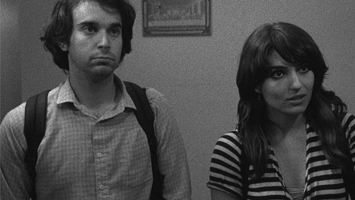 ARP: So, we were in this position where we had played three places. Major cities, good festivals, good responses, but no formal reviews. And that’s weird. So [Ignatiy’s] review really changed things, and everything Adam got us I really valued. He got us Variety, which was insane—we never would have got that otherwise. And he got us indieWIRE. I’ve known Eric Kohn socially, but Adam got him a DVD and got him to put it in his coverage of BAMcinemaFEST, which was also important. And the indieWIRE profile. He killed it. That, and Ignatiy’s review, all of a sudden, people said, “Oh, I heard you were a breakout hit at BAMcinemaFEST, and you’re one of the films there that doesn’t have distribution.” Now, jumping ahead to the fact that we are opening there? When I screened there I said, “Well, this is a dream come true. I have a BAM calendar with my name in it. I can’t believe this. Nothing will be better than this.” And now the fact that we are playing there for a week is crazy. For me, that was the end. I’d been going there for five years, the movie’s playing there, end of conversation. So the value of the building of that buzz around the movie, which you know, you and Tom were very helpful in. Tom was aggressively promoting the BAM screening, getting all of his friends to come and emailing friends to say, “Tell me and I will buy tickets in advance so we can all go and then we’ll hang out afterwards.” Invaluable. That’s something that Tom could bring to the life of the movie that a programmer at a bigger, flashier festival wouldn’t do. They wouldn’t be like, “This movie is mine. I love it. I’m gonna buy tickets for people to come see it when it opens in the town where I live.” He was aggressively supportive, and that was really important.
ARP: So, we were in this position where we had played three places. Major cities, good festivals, good responses, but no formal reviews. And that’s weird. So [Ignatiy’s] review really changed things, and everything Adam got us I really valued. He got us Variety, which was insane—we never would have got that otherwise. And he got us indieWIRE. I’ve known Eric Kohn socially, but Adam got him a DVD and got him to put it in his coverage of BAMcinemaFEST, which was also important. And the indieWIRE profile. He killed it. That, and Ignatiy’s review, all of a sudden, people said, “Oh, I heard you were a breakout hit at BAMcinemaFEST, and you’re one of the films there that doesn’t have distribution.” Now, jumping ahead to the fact that we are opening there? When I screened there I said, “Well, this is a dream come true. I have a BAM calendar with my name in it. I can’t believe this. Nothing will be better than this.” And now the fact that we are playing there for a week is crazy. For me, that was the end. I’d been going there for five years, the movie’s playing there, end of conversation. So the value of the building of that buzz around the movie, which you know, you and Tom were very helpful in. Tom was aggressively promoting the BAM screening, getting all of his friends to come and emailing friends to say, “Tell me and I will buy tickets in advance so we can all go and then we’ll hang out afterwards.” Invaluable. That’s something that Tom could bring to the life of the movie that a programmer at a bigger, flashier festival wouldn’t do. They wouldn’t be like, “This movie is mine. I love it. I’m gonna buy tickets for people to come see it when it opens in the town where I live.” He was aggressively supportive, and that was really important.
So now it’s like July. BAM is over. Locarno is looming, and the second life of the movie is about to begin. At this point, for me it was, “We have to get it into as many festivals as possible. That’s all that matters. This movie will never get released. This will never be distributed. Let’s give everything we’ve got.” Because based on people’s responses I was like, “I should be lucky for this.” I don’t want to be ungrateful. If this is the life of the movie, I’ve killed it. If this is it, and this many peers and friends and supporters are enthusiastic? Then we’re done. We have completely nailed our goal. And my life will be easier from here on out. Things cannot get better. End of conversation. That’s basically how I felt on July 1st, when BAMcinemaFEST ended.
H2N: Then came the next phase!
ARP: So, Locarno began in August.
H2N: And when was the notice from Locarno?
ARP: Our screening at BAM was Sunday, June 19th, and on Saturday June 25th I got the email from Olivier [Pére] who said, “We’re gonna invite it to Locarno.” And I was like, “Well, this is unbelievable. I can no longer say I have no more screenings lined up.” [H2N laughs] Which I had been saying for the last six days.
Look at it this way. This is very arrogant, but it’s true. How many American movies are playing at Cannes every year—not in competition; not, like, James Gray movies? Two. Three, maybe. And everyone knows that. More like two. How many movies play in Venice? Zero. There has not been an American independent movie in Venice in the last five years as far as I know. If there has been, I do not know about it. And Berlin is a little friendly. I mean, they played Silver Bullets. They’re a little bit friendly, simpatico to the American plight. [H2N laughs] Rotterdam, also friendly. Rotterdam plays like five cheap-ass American movies. And that’s it. But the Locarno thing changed everything. Because this is like a 65-year-old festival with attendance in the tens of thousands. There was no processing this. I was just like, “I don’t know what to do.” And from there we picked up traction for other festivals like Vienna and Ljubljana, Belfort, Vancouver, Mar Del Plata, all these places.
Again, what I find irritating about most narratives is this perceived lack of difficulty. And I feel like the difficulty for me getting to this point was extreme. Because this premiered in August of 2011, Impolex in the spring of 2009, so there’s a long gap between these two steps on the path. Premiering a movie in the midnight section at a festival like CineVegas, which is amazing, versus premiering a movie in the first-or-second film competition, which is sort of the Director’s Fortnight section of Locarno? There’s a long distance between those two. And I hate the notion that I had it easy between those two. Because it was very difficult!
H2N: I’m interested in something that’s kind of hard to express, but I guess it’s the question of what you perceive as success versus a more traditional or expected manifestation of that. Like, I think we would both consider showing our films in theater 3 at BAM as a major milestone. But sometimes you attain those goals and they don’t measure up. Something like, “Man, I thought being mentioned in Film Comment would be huge but it’s actually not that big of a deal.”
ARP: Didn’t Film Comment say your movie was shot on video?
H2N: Oh yeah. The wrong format credited to the wrong cinematographer!
ARP: I will say this: I only read Film Comment in the toilet. [both laugh] I get a free subscription to it because I have a membership at Walter Reade and it comes in the mail and I put it right in the bathroom.
H2N: But that idea of you having your own milestones. I know that a European premiere at somewhere like Locarno was a major one for you. And you just had a NYTimes profile. But really, honestly, what are the ones that felt like truly getting over the hump of being taken seriously as a filmmaker?
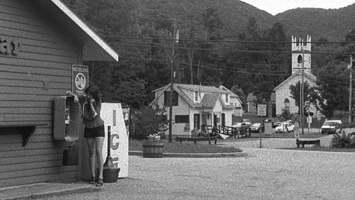 ARP: BAM was a big thing. I announced it ‘cause I keep my database. I sat and watched my movie at BAM, and it was my 179th film since I started going there. First movie I saw there, as I announced in my intro, I saw The 400 Blows alone, on my birthday, in 2005 at BAM. Because I had nobody to go with, I was in New York for the summer, it was in between my junior and senior year at NYU, and I was working at Kim’s. Saw 400 Blows by myself, on my birthday. First time I’d ever been to BAM. So, six years later, premiering a movie I’d directed in the 300-seat theater, sold out audience—I mean, a lot happens between point A and point B, but that really felt good. That was an emotional, logistic, narrative conclusion to a story of me. When I moved to Brooklyn I was like, “I wanna be near BAM, ‘cause I wanna be able to walk there; I go there all the time.” That felt like success. I said at the end of that screening, I had nothing else lined up, I was like, “I’m done. If this is the movie, then we’ve succeeded.” One of my favorite theaters in all of New York, and definitely the best theater in Brooklyn. That was success. And then Adam’s press that he got helped. Locarno was a turning point. I did an internship in 2004—do you know the American Pavilion in Cannes?
ARP: BAM was a big thing. I announced it ‘cause I keep my database. I sat and watched my movie at BAM, and it was my 179th film since I started going there. First movie I saw there, as I announced in my intro, I saw The 400 Blows alone, on my birthday, in 2005 at BAM. Because I had nobody to go with, I was in New York for the summer, it was in between my junior and senior year at NYU, and I was working at Kim’s. Saw 400 Blows by myself, on my birthday. First time I’d ever been to BAM. So, six years later, premiering a movie I’d directed in the 300-seat theater, sold out audience—I mean, a lot happens between point A and point B, but that really felt good. That was an emotional, logistic, narrative conclusion to a story of me. When I moved to Brooklyn I was like, “I wanna be near BAM, ‘cause I wanna be able to walk there; I go there all the time.” That felt like success. I said at the end of that screening, I had nothing else lined up, I was like, “I’m done. If this is the movie, then we’ve succeeded.” One of my favorite theaters in all of New York, and definitely the best theater in Brooklyn. That was success. And then Adam’s press that he got helped. Locarno was a turning point. I did an internship in 2004—do you know the American Pavilion in Cannes?
H2N: I know of it.
ARP: Do you go to Cannes?
H2N: I have never “Cannes’d.”
ARP: Well, there’s this internship program there called the American Pavilion, which is like…
H2N: I did Telluride’s Student Symposium in ’97, though!
ARP: I’m sure it’s the same experience. At the American Pavilion, you work in a tent, which is where people come to—when I worked there, check their email before they had it on their phones. Or send faxes, drop stuff off. There was a café in this pavilion. They have an internship program, still functional, a lot of fun. I went there and it’s like a hundred people, and I was like, “This is fun. I’m at Cannes. I am a sophomore in college. This is insane.” Also—and this is very depressing—“I don’t ever want to come to a festival like this unless I am the man.” A lot of people are very excited to be here. They’re throwing business cards all over the place that basically say “film student” on them. And I was like, “This sucks. I hate this. I don’t want to come to a festival like this and be the guy who’s throwing business cards around. I want to be the guy who comes to this festival and has my movie being presented at a sweet-ass premiere.” Because that seems like a lot more fun than the guy who’s like a third-tier employee of some distribution company, who all the film students think they need to get in good with. So this is 2004. And it was definitely a fun program, because you’re in Cannes from opening night to closing night, so it rules. But it also really focused me on what was important. So going to Locarno was like, “Well, I’ve accomplished that goal.” It’s 2011, I’ve had this goal since 2004—seven years. Seven years ago, I was in Cannes, helping people fax things. Now I’m in Locarno, my movie is premiering for 1,000 people, which is nuts. A huge-ass screening, second day of the festival, 7:30pm in the sidebar competition. It’s comparable to Un Certain Regard or Director’s Fortnight. Every movie I saw in that section was fun, brilliant movies from around the world. The main competition was like Aza Jacobs and Mia Hansen-Love, people who have been around. And I was like, “This is crazy. What am I doing inside the bloodstream of this establishment? I’m 27. I don’t belong here.”
Every person I talked to there couldn’t believe what the movie cost, and then couldn’t believe when I told them what other American movies cost. We were the cheapest movie there by 65%. The next cheapest movie cost I think three times as much as we did. And they were just like, “You can’t make movies for what you’re telling us your movie cost.” And I told them, “Well, I can, I’m here, I’m in the same section as you are, so you are wrong.” [H2N laughs] “Perhaps you can’t because you live in a country where the government gives you money.” I’ll bet in Maryland I was probably in the top 90% percentile of expense. I was thinking, The Dish & The Spoon, Green, Wuss, Bad Fever, I was like, “My movie cost more than all of these movies!” [ED. NOTE: Because of shooting on 16mm] And here I’m like a joke. Here, people think I’m lying when I tell them my budget. And also everyone likes it. I’m having a great time and people are being very responsive. Maurice Pialat’s widow was like, “I heard your movie’s good, I want a copy of it.” I’m like, “Well this is f**kin’ crazy.” Pedro Costa saw it there and really liked it and I’m like, What am I doing? I had gone in two months from screening at BAM for a lot of friends to Pedro Costa?
H2N: So think of Wednesday post-BAM to that.
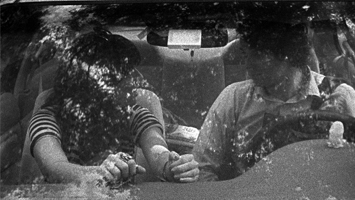 ARP: Yeah. There’s a big gap in the middle there, but it was also just a gap of inactivity. To being like, “Pedro Costa wants to talk to you, he really liked your movie.” This is the exact sentence: “Pedro Costa saw your movie. He’s a huge Jerry Lewis fan. He wants to talk to you about your movie and also Jerry Lewis.” And I thought, “I’m out of my element. I cannot have that conversation because that’s ridiculous.” [H2N laughs loudly] “Because his retrospective was happening at Anthology when I worked at Kim’s, and his Criterion box set came out when I was working at Kim’s. He can’t want to talk to me. That’s not possible. That’s not allowed. There is no world where that makes any sense!” [H2N laughs] Or like when you wrote me to say that David Gordon Green wrote you to say, “I’m watching The Color Wheel and then I’m going to see Tree of Life.” There is no world where this is allowed! Again, somebody whose DVDs I was putting on the shelf, as, like, a hero. And it’s just like, “Oh, I’ll watch this movie.” There’s just a very fuzzy area in the middle there and it happened very quickly and I don’t understand why.
ARP: Yeah. There’s a big gap in the middle there, but it was also just a gap of inactivity. To being like, “Pedro Costa wants to talk to you, he really liked your movie.” This is the exact sentence: “Pedro Costa saw your movie. He’s a huge Jerry Lewis fan. He wants to talk to you about your movie and also Jerry Lewis.” And I thought, “I’m out of my element. I cannot have that conversation because that’s ridiculous.” [H2N laughs loudly] “Because his retrospective was happening at Anthology when I worked at Kim’s, and his Criterion box set came out when I was working at Kim’s. He can’t want to talk to me. That’s not possible. That’s not allowed. There is no world where that makes any sense!” [H2N laughs] Or like when you wrote me to say that David Gordon Green wrote you to say, “I’m watching The Color Wheel and then I’m going to see Tree of Life.” There is no world where this is allowed! Again, somebody whose DVDs I was putting on the shelf, as, like, a hero. And it’s just like, “Oh, I’ll watch this movie.” There’s just a very fuzzy area in the middle there and it happened very quickly and I don’t understand why.
H2N: But now it’s gone, right?
ARP: Well, mostly gone. Gone for now. I still have a voice-mail from Sean [Price Williams, cinematographer of Perry’s films, as well as many, many others]. I wish he was here to talk about it, but the voice-mail is a long pause and he’s just like, “I don’t want to tell you this, because it’s gonna make you so insufferable. I hate having to tell you this, but Leos Carax watched your movie and he really loves it, and he wants to meet you when he comes to New York.” I can’t live in a world where Leos Carax knows who I am, watches my movie, likes it, and thinks, “I wanna meet that guy.”
H2N: But that is exactly what this conversation is most valuable for. No one ever talks about this stuff!
ARP: It’s really not talked about.
H2N: It’s never talked about!
ARP: Is it because you’re not supposed to talk about it?
H2N: Yeah, because at that point, you’ve already crossed over, so to acknowledge that you once weren’t crossed over, might nullify the fact that you are crossed over. It’s like some Twilight Zone sh*t.
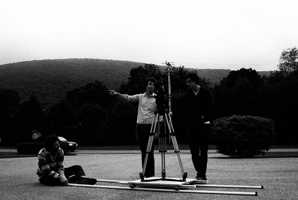 ARP: I appreciate that. That’s an important dichotomy, because I’m wondering if it’s very uncool to discuss the moment when you transition from being some broke-ass nobody to a broke-ass somebody. [H2N laughs] People don’t talk about that. People don’t talk about that moment. I’ve never heard Lena [Dunham] talk about the moment where she, like, met Nora Ephron. She was someone who I met at parties and I hung out with, and then two years later she’s like, “Oh, Nora Ephron’s a friend of mine.” Aaron [Katz] and I were talking about this. We don’t understand what happens in the middle of those two points. What happened in the middle for me was total disbelief, utter incredulousness, and a complete sense of befuddlement. First of all, nothing changes, and you know this—there are people, myself included, up to a year ago who were like, “If your movie plays at Sundance, your life is set in stone. Your next movie is finished. You’re over, you’re done.” But there are people in the world who think if your movie plays at Locarno, that’s like playing at Cannes. You are as high as you can go, as respected as you can get, you’ve presented your film in the best of situations. But it’s like, at the end of every one of these festivals, I still came home, sat in my apartment and was like, “Well, I have no money! [H2N laughs] This is great and I’m really proud of myself, and like the editor of Cahiers du Cinéma saw the movie at Locarno and is writing a profile of me, which is amazing and also f**king insane. I’m not gonna profit off of that. I’m just gonna go home and sleep with my cats until noon, ‘cause I have nothing else to do.” And this continues to now. I’m getting these emails from people who are like, “Wow, NYTimes? You’re done!” And it’s like, well, actually I’m not, because the other night my girlfriend and I got Chinese takeout, split a pint of ice cream, watched Game of Thrones, and fell asleep at midnight. [H2N laughs] That’s my life!
ARP: I appreciate that. That’s an important dichotomy, because I’m wondering if it’s very uncool to discuss the moment when you transition from being some broke-ass nobody to a broke-ass somebody. [H2N laughs] People don’t talk about that. People don’t talk about that moment. I’ve never heard Lena [Dunham] talk about the moment where she, like, met Nora Ephron. She was someone who I met at parties and I hung out with, and then two years later she’s like, “Oh, Nora Ephron’s a friend of mine.” Aaron [Katz] and I were talking about this. We don’t understand what happens in the middle of those two points. What happened in the middle for me was total disbelief, utter incredulousness, and a complete sense of befuddlement. First of all, nothing changes, and you know this—there are people, myself included, up to a year ago who were like, “If your movie plays at Sundance, your life is set in stone. Your next movie is finished. You’re over, you’re done.” But there are people in the world who think if your movie plays at Locarno, that’s like playing at Cannes. You are as high as you can go, as respected as you can get, you’ve presented your film in the best of situations. But it’s like, at the end of every one of these festivals, I still came home, sat in my apartment and was like, “Well, I have no money! [H2N laughs] This is great and I’m really proud of myself, and like the editor of Cahiers du Cinéma saw the movie at Locarno and is writing a profile of me, which is amazing and also f**king insane. I’m not gonna profit off of that. I’m just gonna go home and sleep with my cats until noon, ‘cause I have nothing else to do.” And this continues to now. I’m getting these emails from people who are like, “Wow, NYTimes? You’re done!” And it’s like, well, actually I’m not, because the other night my girlfriend and I got Chinese takeout, split a pint of ice cream, watched Game of Thrones, and fell asleep at midnight. [H2N laughs] That’s my life!
H2N: Like, does anything concretely, dramatically change the morning after these articles are published? No.
ARP: No. The assumption—and this is the assumption I held for years—is you just imagine that’s what over that next hump is this Eden of opportunity and success. And for me it was like, “I want to make a movie. I want to get over that hump.” And I made Impolex and I was like, “Well, I made a movie, it’s played at a handful of festivals, nothing has changed.” So it was, “I guess I should make a movie that plays at more festivals, better festivals.” And I made another movie that played at more places and I realized, “Well I’m still in the same place. Perhaps if this movie plays at ‘better’ festivals—you know, international festivals—I’ll be over a new hump and I’ll get more press, and then I’ll finally be home free.” And it’s like, well, I’m there and I feel the same. There’s no money coming in, no offers, I’m still just the same person. I still go home every night to the same cats, the same girlfriend [H2N laughs], which is perfect.”
H2N: Your cats and Anna [Bak-Kvapil] are awesome, so that means you win.
ARP: I’m not denigrating that experience! There has yet to be a thing where I’m like, “If I can get this, then I’m on Easy Street.” Everything that I think that about, I get there and I’m like, “Well, I’m not on Easy Street yet.” Like, the Cahiers thing, they do a New York issue. And it’s [Abel] Ferrara, Ramin Bahrani—who I have no opinion on, I’ve never seen any of his movies—Josh and Benny [Safdie], Ronnie [Bronstein], me, and Marie Losier. And that was insane, ‘cause Cahiers is a magazine I’ve been aware of since I was 19 years old, as the coolest thing in the world. This would change everything! And it did help get French distribution, because we were on the fence with a French distributor and right after it was published they made me a firm offer, which was great. I mean, you tell me when I’m 23 that being in Cahiers du Cinéma will change very little for your life, I’d be like, “That’s crazy. That will change everything! Once I get there, I’m basically writing my own checks.” But it didn’t. And that’s true of a Variety review, getting into great festivals. You’re still the same person. Your movie’s not changing. The movie that played at Locarno is the same movie that played at BAM. Nothing is different.
H2N: So how do you steel yourself and your ego when it comes to those initial rejections? Whether it’s a polite rejection or, in some cases, a very loud rejection! Or did a Sarasota or BAM acceptance keep you from wallowing in it too much?
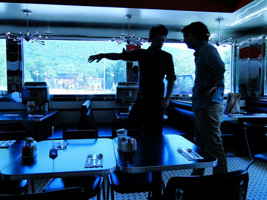 ARP: I was never allowed to wallow. I don’t remember the chronology right now—this is written down in the other thing I was trying to finish—but Mike Plante’s Sundance decline was very generous, very understandable. It’s a very ugly, nasty movie. I don’t expect everyone to love it. But I remember sometime after the SXSW rejection… that night, I remember my girlfriend and I ordered a pizza, and while it was being made we went to Reel Life—the video store I wrote about for you guys—rented Piranha 3D, and I hadn’t told her that I’d been rejected yet, because I didn’t feel like getting into it. And one of our cats jumped on the pizza box, and our pizza fell on the floor, and I was picking up this pizza off the floor—with the intention of still eating it—and I just wanted to watch Piranha and eat this pizza, I didn’t give a f**k, and I was just like, “Well, Anna, there’s no better time to tell you: the movie’s been rejected from South by Southwest, and I’m going to eat this pizza off of the floor—ideally while we watch Piranha and not talk about this.” She was like, “That’s f**ked up, are you sure you wanna watch it?” And I was like, “Don’t talk. Don’t judge me for eating this pizza off of the floor. Let’s watch Piranha.” And when the movie was over we talked about it. But that’s a low point. I mean, I was eating pizza off of the floor. Not because I had to, but because I felt like I needed to. So let’s say that was on a Monday or something, and I feel like I told her definitively, and we have a record of this conversation because I remember talking to her about it, I said, “I’m not gonna finish this movie. It’s not worth it. I’m so tired of it. It’s February, I have been editing this since July? It’s over. This is going to be so embarrassing to have to put out there. It’s done.” And then, within ten days, Tom, Jake, the Wisconsin Film Festival, and then a week later Eric at Maryland were all like, “We’d love to show it.” And at that point Anna said, “You have to finish it.” Because these are all great places. You want to screen at all these.
ARP: I was never allowed to wallow. I don’t remember the chronology right now—this is written down in the other thing I was trying to finish—but Mike Plante’s Sundance decline was very generous, very understandable. It’s a very ugly, nasty movie. I don’t expect everyone to love it. But I remember sometime after the SXSW rejection… that night, I remember my girlfriend and I ordered a pizza, and while it was being made we went to Reel Life—the video store I wrote about for you guys—rented Piranha 3D, and I hadn’t told her that I’d been rejected yet, because I didn’t feel like getting into it. And one of our cats jumped on the pizza box, and our pizza fell on the floor, and I was picking up this pizza off the floor—with the intention of still eating it—and I just wanted to watch Piranha and eat this pizza, I didn’t give a f**k, and I was just like, “Well, Anna, there’s no better time to tell you: the movie’s been rejected from South by Southwest, and I’m going to eat this pizza off of the floor—ideally while we watch Piranha and not talk about this.” She was like, “That’s f**ked up, are you sure you wanna watch it?” And I was like, “Don’t talk. Don’t judge me for eating this pizza off of the floor. Let’s watch Piranha.” And when the movie was over we talked about it. But that’s a low point. I mean, I was eating pizza off of the floor. Not because I had to, but because I felt like I needed to. So let’s say that was on a Monday or something, and I feel like I told her definitively, and we have a record of this conversation because I remember talking to her about it, I said, “I’m not gonna finish this movie. It’s not worth it. I’m so tired of it. It’s February, I have been editing this since July? It’s over. This is going to be so embarrassing to have to put out there. It’s done.” And then, within ten days, Tom, Jake, the Wisconsin Film Festival, and then a week later Eric at Maryland were all like, “We’d love to show it.” And at that point Anna said, “You have to finish it.” Because these are all great places. You want to screen at all these.
H2N: I remember in the same week or two-week span, both Tom and Jake were like, “Oh man. You have to see it.”
ARP: It’s just a wave. I missed the first wave, and the second wave of April/May/June festivals were totally on board with it. And I remember telling her—the details are foggy to me now, but that’s probably because we’re on our third pitcher—but it was like a Friday night and I told her, “I’m not gonna finish it. I can’t spend the money on color correction, sound mixing, it’s not worth it,” and then Saturday morning I was making brunch, and I got an email from Tom saying, “I want to show it.” And she was like, “You look like an asshole now for having a five-hour conversation with me last night about how this was all for nothing, because now you have to show it. I know you want this.” And it was difficult to confront the fact that, yeah, I did want that. And I knew that places like Sarasota and Maryland and BAM showcased movies that played at other festivals, realizing then that the value is being in good company and not being the first horse out of the gate. That was essential. Because something I learned by the time of AFI in November was that unless you get distributed before the end of the year, you’re running a marathon. And there could be movies that premiere at Sundance that like sprint out of the gate and are dead by June, and there are gonna be movies like mine that—I don’t wanna say limp out of the gate—but ease out of the gate in April, and by November and December are wildly alive and kicking, because of pacing yourself and playing your cards right. I’m sure if you looked at last year’s Sundance or SXSW lineup you’ll be like, “What the f**k happened to that movie? I saw that there and I’ve never heard of it again.” And that’s irrelevant. I was telling somebody this—did you see The International Sign For Choking in Maryland?
H2N: No, I missed it.
ARP: ‘Cause that movie played at IndieLisboa and I was hanging out with Zach [Weintraub], the director, and I said, “You’re better off playing at Maryland and BAM than you would have been playing at either Sundance or South by Southwest and neither of those other two festivals. Trust me.” Those two, one-plus-one equals more than either one of those other ones plus nothing. I said, “Sophia will get people to come see it at Maryland, BAM will be great for you, and come July you’ll be in a better place than a movie that played at Sundance and has not played anywhere since then.” And I really believe that. Again, it’s important for me… I just want other people to know that, because I didn’t know that at all. This time last year, I sort of knew it, but two years ago, I definitely didn’t know that.
H2N: The trouble and beauty of it is that there’s no perfect alchemy or way to say definitively, “Here’s why it’s better to do it this way.” I mean, you can explain your trajectory, but ultimately I feel like each film has its own momentum. Is that being too hippy about it?
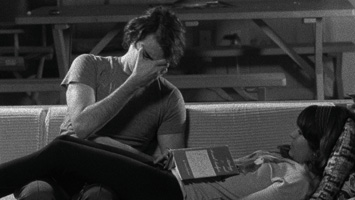 ARP: No. You were released in July, right? So the second half of the year is irrelevant. Things like Denver, AFI, those are not important, because you were spent, the race was over. But for me and Sophia, who went into December or January with no distribution plans, we were like, “This could be it.” No two things have the same trajectory. There is no “right” trajectory. If you have Compliance or Nobody Walks and you premiere at Sundance and you are sold by the end of the festival, yes, that is a correct trajectory. [H2N laughs] But your life is easy, as of one week after your movie’s premiere. But I believe, and everyone does, that that’s it. If you don’t do that, you’re f**ked. Premiering in April, being undistributed until January, and having a distribution plan come into effect in February, is not easy like that. But it’s certainly working out well for me. It keeps us on your internet feed for two years, which sucks for people who don’t care about it—[both laugh]—but it’s great for me! I mean, I don’t want to still be doing Q&A’s now, but it’s nice that we had a year of festivals and we’ll have half a year of theatrical.
ARP: No. You were released in July, right? So the second half of the year is irrelevant. Things like Denver, AFI, those are not important, because you were spent, the race was over. But for me and Sophia, who went into December or January with no distribution plans, we were like, “This could be it.” No two things have the same trajectory. There is no “right” trajectory. If you have Compliance or Nobody Walks and you premiere at Sundance and you are sold by the end of the festival, yes, that is a correct trajectory. [H2N laughs] But your life is easy, as of one week after your movie’s premiere. But I believe, and everyone does, that that’s it. If you don’t do that, you’re f**ked. Premiering in April, being undistributed until January, and having a distribution plan come into effect in February, is not easy like that. But it’s certainly working out well for me. It keeps us on your internet feed for two years, which sucks for people who don’t care about it—[both laugh]—but it’s great for me! I mean, I don’t want to still be doing Q&A’s now, but it’s nice that we had a year of festivals and we’ll have half a year of theatrical.
H2N: I don’t really have an agenda with this conversation, but I’m now thinking this is a great opportunity to get across this point. Like, you get your Sundance rejection, you get your Berlin rejection, you get your SXSW rejection, and you think, “Why did we even make this movie, man?” But that’s horsesh*t. It’s understandable, but it’s horsesh*t.
ARP: Exactly. Look, I was so thrilled when I saw that there were several premieres in the “Independent Visions” section at Sarasota this year. Good. Two years ago, I might not have considered it a great premiere, but I consider it a great premiere now. I hope that someone else will say, “Well, that movie played there and it did well, there’s nothing wrong with that.” With Impolex, certainly that was part of it, and that was part of my life and a lot of people’s lives. But I think—and I know now from experience—Sarasota’s a great place to present a film, because they bring great people down there. Maryland would also be a fantastic first screening. BAM would be a fantastic first screening. These are all places that people pay attention to, and they don’t pay attention to it because the media’s there, they pay attention to it because it’s fun, and there are good films, there’s hanging out, and there are cool people. Someone like Calvin. The Oregonian? That movie shouldn’t play in Sarasota, as a city. But the fact that Tom supports it, he’s like this movie is great, and then it wins an award there and Calvin gives some weird-ass acceptance speech, I thought, “This is great!”
It’s very important to me that people understand there are so many options. The options you’re familiar with, and movies like Compliance or whatever, they premiere, they’re sold, they’re released in theaters six months later, and that’s easy. Everyone hears about that and everyone knows that, because it’s got great press and the screenings are very exciting. But I feel like there’s more than that, and I’m happy to be a counterpoint to that argument, and not be one of those people where it’s just like, “Well, his path was easy. He premiered at this ‘great’ festival and his life was set.” It was more like coming in the side door and clawing your way into, at this point, national distribution and international acknowledgment, which is not part of the plan. You can never count on that. I could have definitely premiered at any number of other festivals and not had the Locarno second wave of momentum that carried us through a number of great festivals, and foreign deals through the rest of the year. But that just fell into place—somewhat circumstantially but it was also very exciting. I wish I had known a year-and-a-half ago that patience is a virtue, nothing easy comes right away to 99% of people, and failure is not apparent right away. Perhaps your first couple movies didn’t have the big, splashy premiere, and instant sale. That doesn’t mean there’s no value to that experience. You might be in a position where even I’m thinking, man, “If we could have gotten a deal with IFC or Fox Searchlight, that would have been so great.” But then you talk to someone who had that deal and they’re like, “Eh, it’s not so great.” There are just as many problems and complications with that: “We were mishandled,” “We didn’t do as well as we could have,” “I didn’t like when they decided to open the movie or the angle they took with our publicity.” If you get that goal, you’re not done.
H2N: You’re handing your power over to people in a dramatic way. Though, to be clear, I don’t have any regrets at all. I was just happy to not be in debt for another five years.
ARP: Well, that’s another virtue.
H2N: But I understood that. I also understood what movie we f**king made!
ARP: Everything that I’ve thought would be satisfying has proved unsatisfying once I’ve accomplished it. And the things I’ve yet to accomplish I no longer desire, because I’m sure they will be unsatisfying as well.
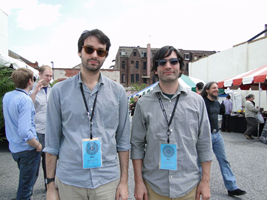
Alex Ross Perry And Michael Tully Wearing Accidentally Matching Uniforms At The 2011 Maryland Film Festival
[Both ARP and H2N go to the bathroom, and begin to wrap up before ARP decides he still has something he wants to say.]
ARP: Thinking about what we’ve been saying, I feel it’s important that I not position or perceive myself as the embittered outsider who, like, failed and then stumbled into something good. Because I don’t like that type of presentation either. I don’t want to sound like the person who considers the year of the movie to be littered with failure, because we succeeded in a lot of ways. What’s important to remember, and something that you understood when you first saw it in Sarasota, when you come out with something that’s very adamantly swimming against the current and visually and stylistically not what people want to be seeing, or are used to seeing, automatically you’re making things harder for yourself. And that’s our choice to bring that hurt upon your life, and make something that you’re prepared for people to be like, “I hate this. I hate the way your movie looks. I hate the way your movie feels. Why would you bother making this?” You’re bringing that upon yourself. And I know that—having made my first movie, I know what that’s like, the extent to which I feel very lucky that we were able to… I mean, presenting this film at BAM and AFI, New York and LA, was just unbelievable. And having other screenings like Maryland, Sarasota, Denver, it’s lucky. Because you’re making something that’s not within that framework. And I feel very grateful that anyone looked at this grainy, 16mm, black-and-white movie about angry, obnoxious people and were like, “I wanna play that. I wanna charge people admission to watch this movie.” Because that really says something about the people who chose to present the film. And it says something about the people who are now choosing to distribute it. I don’t want to sound like some embittered codger who’s out of touch with what’s happening and hates all the modern trends, because it’s awesome that we’ve gotten to where we have. But it’s because of tireless support from a handful of programmers and critics who recommended the movie to friends—Ignatiy, you, Tom, Jake, Karina [Longworth], the LA Weekly was very supportive of it, Olivier Pére and Mark Peranson at Locarno, were very supportive of the movie and talked it up to people—and that’s really lucky. Anyone should be lucky to find their movie in that position. I’m not bitter about any of that, because look at where the movie… I thought it was amazing to play one night at BAM? We’re playing for a week at BAM.
H2N: On a 35mm print…
ARP: On a print that a distributor is making. There’s nothing crazier than that. And that’s really humbling, and it makes me feel really grateful to all the little tiny pieces of support. Like, there was a time last year where I would be excited if somebody tweeted about the movie. And now it’s like, I get a good review and I’m just like, “Eh, who gives a sh*t, we have a hundred.” [H2N laughs] Something changed in the middle there, from me being…
H2N: Talk about that, how the desire to see a review, any review, quickly dwindles away.
ARP: Something changed in the middle there, where I went from being like, “Any mention of this movie is a victory,” to being like, “Yeah, whatever, we’re opening in this city, we’re gonna have reviews in their local paper, who gives a sh*t. They’ll be good, they’ll be bad. Is it gonna benefit me financially?”
H2N: But that also takes into account the understanding that you are confident that it’s going to be mentioned. That might be the difference, right? At first you’re like, “Do people even know my movie exists?” But once you get over that hump…
ARP: Well, it’s like when you’re playing at a festival, you go, “I hope we’re mentioned in the curtain raiser coverage,” like BAMcinemaFEST, “I hope we’re one of the eight movies out of twenty that are mentioned in this piece.” I remember you texting me and you were like, “A.O. Scott obliquely mentioned our movies in some weird way.” [H2N laughs] And I was like, “What the f**k does that mean?” In a parenthetical he said, “Go see these movies, and then debate over how you feel about them.” And it was like, whatever, but I was like, “Holy sh*t, the movie’s name is in the New York Times!” [ED. NOTE: A.O. Scott’s just posted, utterly glowing review only confirms my suspicion that he had no idea what to make of certain BAMcinemaFEST titles at the time] And now it’s like 1,000 words in the Sunday Times and I’m just like, this is amazing. Not everybody gets this. I’m flattered, I’m humbled—but let’s not get too excited. Let’s wait a month and see if this has any effect on my life. Let’s see if anyone emails me saying, “Oh, you seem like you’ve succeeded. Would you like to make another movie?” Let me wait and see if that happens because I no longer think that it’s that easy.
I used to think there was nothing more important than good press and good reviews. But there is. I feel like what is more important is respect and acceptance from your peers. I would rather have ten filmmakers see the movie and tell me they loved it than a hundred journalists.
H2N: Yes.
ARP: Filmmakers who are currently working. That’s why I the screening at Maryland was so great, where in our 170-seat theater, I feel like 80 seats were filled up with badge holders. You were at the first screening with your sister, but that second screening, I feel like everybody was there.
H2N: Without a doubt, the most invigorating reactions I got were from filmmakers who genuinely appeared to dig our movie. Because they know how hard it is to make something and to take a risk. So when people respond to that, it’s way more dramatically fulfilling than a non-filmmaker who’s simply writing a thoughtful, but studied, review.
ARP: Even last year, just at Sarasota, you and Calvin being like, “Wow, it’s amazing that you shot this movie on 16,” and then after our second screening, Todd Rohal saying, “I can’t believe somebody committed so fully to making a comedy for film festivals.” [H2N laughs] And then Ronnie being like, “I can’t believe you committed so fully to making such a reprehensibly angry and despicable movie.” The fact that all these filmmakers said that you’ve taken this one thing to the extreme, that it’s very admirable, is very exciting.
H2N: And you did. On your terms.
ARP: With no regard for any sense of reception or any hope. That the honesty and genuine quality has been responded to so enthusiastically because people sense that you’re not making a calculated move to impress or succeed. “This is a really dark and weird personal statement. I really admire the person who committed to making this movie. And then actually made it, and is now forcing people to watch it.” That’s very exciting, and it’s very humbling. And once you get to that point, you get past the rejection and then the hubris of whatever success you can scrape together, and you get to the point where it’s like, “Peers are happy. I’m earning a little bit of respect. I’ve made a lot of new friends, friends that I’ve made because they respect the work, and that makes them want to get to know me.” And that’s really satisfying. That earnest quality has been rewarded with positivity in the press and distribution and that’s unreal. No one could expect that. Like I said, there was a time last year when I thought this movie was done. I was like, “Well, we showed it at a bunch of festivals. All these filmmakers saw it. I have new friends. I showed it in Brooklyn.” End of story. Done. And the fact that here we are a year later…
H2N: And you’re just beginning!
ARP: A hundred more things have happened. I’ve been at maybe 75% of the screenings of this movie ever for a Q&A. And in two weeks, I will have been at 20% of the screenings, because it’s gonna play five times a day in a couple theaters, and all of a sudden it’s just not a thing that I have to be there to answer for. It’s out there. And it’s really humbling, and it helps me to appreciate and understand the months of disappointment—years of disappointment—starting with the rejection of my first movie, up to the rejection of The Color Wheel. And then starting with the warmth and the love that it started to get at festivals. It’s just a really weird trajectory, and it really makes me feel happy that anyone would respond to this thing that’s such a jagged pill that we’re shoving down festivals’ throats. We’re always the ugliest, meanest movie at a festival. And now we’ll be like the ugliest movie in a multiplex. [H2N laughs] Like the cheapest, grainiest, nastiest movie in whatever situation we’re in. And the fact that people are catching onto it, it’s just unreal. I never would have thought about it doing that. It really feels like people are responding to original, daring, risk-taking work. And if anything gives you faith—like in the case of Margaret, you can put this totally truncated, compromised thing out there, and the people who want to love it will find it. And then they’ll tell their friends, and those friends will go see it. And then all of a sudden, it’s like, “You have to go see Margaret. You have to go see The Color Wheel. You won’t believe what this filmmaker thinks they can get away with.” Who would have thought this movie was for anybody? But, yeah, people just find it, and it’s really exciting. Here we are a year later and I can’t believe the thing’s being released on 35.
H2N: On 35 millimeter.
ARP: Released at all! We had issues with music rights, ‘cause I had “Happy Birthday” in the movie and people were like, “You know ‘Happy Birthday’ is copyrighted,’” and I was like, “We’re never gonna get released. We’ll play this at festivals. No one will ever know, and that’s the end of the movie.” And then when we were getting released Jake said, “You have to change that.” And I never thought that would happen! We had to change it. We were in the sound studio, and I could have changed it, overdubbed it right then, but I was like, “We won’t get released. This will never be a legal issue.” And now it is. So we overdubbed it. For that reason, I never covered my bases. I was never preparing that movie for release. It was like, “This movie’s life is right now. Its life is me at screenings at festivals.” It was never, “We’re gonna play on 35mm in 30 cities.” And it’s very, very baffling to me that we ended up there. Totally not what I expected.
— Michael Tully








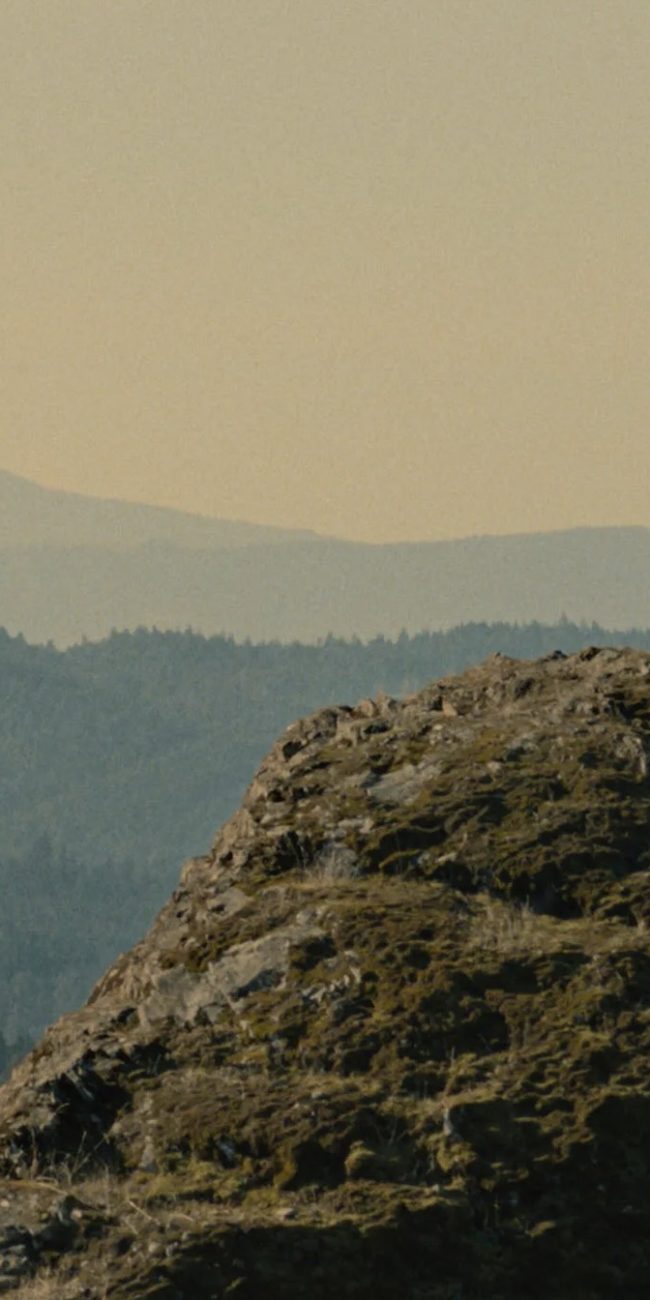
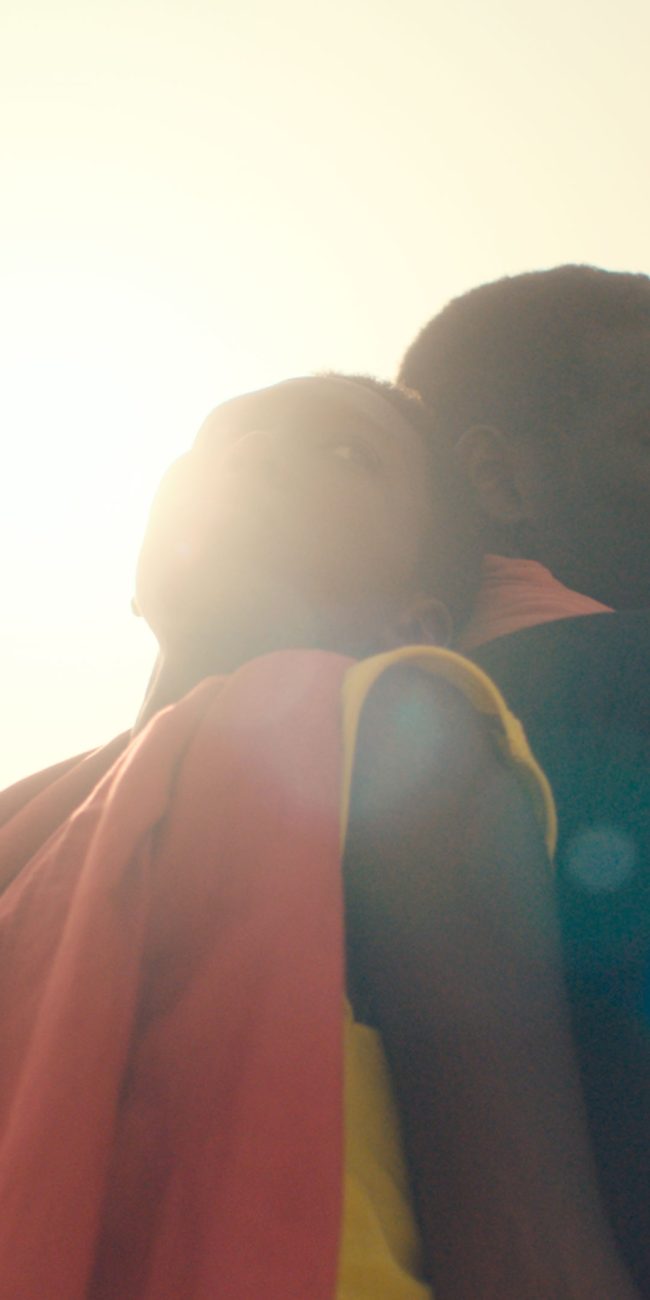


Guest
This is the best interview i’ve ever read on H2N. Thanks for this.
Randall
Cute guy.
Guest
Thanks for the interview. And nothing against Alex Ross Perry who comes off admirably here, but come on, Michael Tully – there’s a smirking, buddy-buddy, hand-job-under-the-table quality to this interview that reeks a bit of blind bias and inserting yourself unnecessarily as the “friend of the filmmaker”. Do you really need to publish your compliments to his girlfriend and every time you laugh and “laugh louder”? Not to mention that A.O. Scott’s review was not “utterly glowing” but as he put it “qualified admiration” – nothing against “The Color Wheel” as Scott is a dweeb with floundering taste. But come on, Perry’s comments without all your laugh-lines would have been perfectly adequate.
Tully
Hey “Guest”, not sure if you have read HTN before but we have never tried to pass ourselves off as objective journalists. We ARE biased—it’s just that we typically choose to concentrate on the act of positive bias. I’m sorry if this sounds like showoffy buddy-buddiness, but this was also a three-pitcher conversation between two people who are friends in real life, so to have presented it any other way would have been inappropriate. That was the entire point of this one, to publish a conversation that wasn’t a typical junket interview—i.e., 12 minutes in a hotel room with someone you don’t know, only to be ushered out so that the next person you don’t know can be ushered in—so it was likely to veer into the type of direction you’re criticizing it for. Maybe I should have nixed the mention of the filmmaker’s girlfriend, or maybe I should have nixed some of those laughs, but ARP was being very funny and I wanted to insert them to make sure they weren’t misinterpreted as statements of uber-serious bravado. Seems like people have been reading into ARP’s interviews recently and thinking he’s more arrogant or cocky than he is. But thanks for your feedback. It has been processed.
Pingback: COLOR WHEEL, THE – Hammer to Nail
Chad Hartigan
Just revisited this and it’s a must-read for any filmmaker that’s ever been rejected or accepted to a film festival.